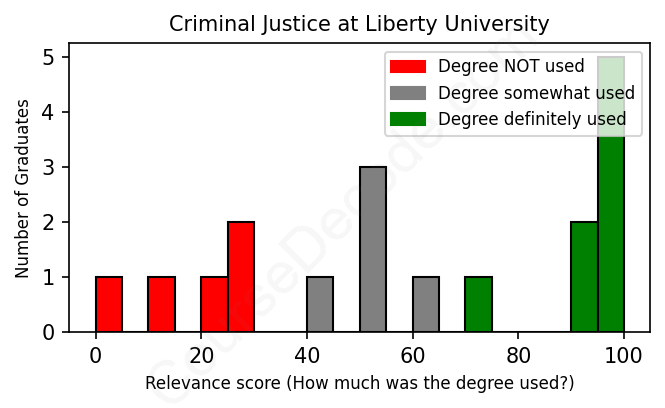
First, some facts. Of the Criminal Justice graduates from Liberty University we've analyzed , here's how many have used (or NOT used) their degree in their career:

These are estimates based on AI analysis of 18 LinkedIn profiles (see below).
The verdict? Below average. Overall, with an average relevance score of 61%, Criminal Justice graduates from Liberty University have a lower likelihood (-6%) of finding work in this field compared to the average graduate across all fields:
And for comparison, here's the chart for all profiles we've looked at across all degrees.
Also, after graduating, 44% of these graduates have pursued further education other than another Bachelor's degree (such as a Masters degree or other), compared to the average across all profiles of 35%. This suggests you may need more than just a Bachelors degree to be competitive as a Criminal Justice graduate.
See the details:
|
Relevance score: 28% We think this person has NOT gone into a career related to their degree. We think this person has NOT gone into a career related to their degree.
DEGREE INFOGraduated in 2021 from Liberty University with a Bachelor's degree in Criminal Justice. No other secondary education since. JOB HISTORY SINCE GRADUATIONBuilding Security State Farm Arena Jan 2022 - May 2023 Armed Security Guard  United Security Agency Nov 2022 - Present ABOUTI have had multiple jobs in the last several years and I believe that with my experience and skills, I can be an asset to your business. Being a hard worker with high values, being punctual, I am always willing to take on new roles and work as part of a team with people who are equally motivated. My communication is superb and my customers service skills are excellent with everyone from co-workers and customers alike. If given the chance to join your team and apply the skills I already have from previous employment, I will prove to you that I am worth your time and will work hard to meet the goals set forth. |
The top 10 most common jobs done by the graduates we've analyzed (ranked most common to least) are:
When looking at the career paths of Liberty University Criminal Justice graduates, there seems to be a significant variety in the roles they’ve taken on. Many graduates are working in law enforcement-related positions such as police officers, sergeants, and crime scene technicians, which are directly aligned with their Criminal Justice education. These roles often require the daily application of the knowledge gained from their degrees, making them highly relevant to the field. On the other hand, there are also graduates in roles that stray pretty far from traditional criminal justice jobs, like marketing managers, claims representatives, and even servers at restaurants. These positions either focus more on business, customer service, or other areas that don’t really utilize the skills acquired through a Criminal Justice program.
Overall, it looks like while many have stuck closely to their Criminal Justice roots by securing roles that utilize their education, a good number ended up in jobs that, while perhaps tangentially related, don’t really demand the specific knowledge or skills related to criminal justice. So, if you're considering a degree in Criminal Justice, it's crucial to think about your career options and how they align with what you want to do professionally. There are definitely solid paths in law enforcement and related fields, but there are also plenty of potential detours into other industries where your Criminal Justice learnings might not be the main focus.
Here is a visual representation of the most common words in job titles for Criminal Justice graduates (this is across all Criminal Justice graduates we've analyzed, not just those who went to Liberty University):

When looking at the career trajectories of graduates from Liberty University with a degree in Criminal Justice, it’s clear that many have pursued paths closely related to law enforcement and public safety. For example, graduates from the earlier classes, like those from 2010 to 2014, have landed roles such as patrol sergeants, police officers, and crime scene technicians. This aligns well with their studies, suggesting that many graduates start with foundational positions in law enforcement and gradually move into more specialized or supervisory roles over time. A notable example is the graduate from 2010, who climbed from a patrol sergeant to an administrative captain within a few years, indicating a strong upward mobility within the field.
However, there are also a number of graduates who have taken a different route. For instance, some found themselves in roles unrelated to criminal justice, venturing into areas like claims management, academic advising, or even city council positions. This suggests a mixed bag of outcomes, where some graduates clearly thrived in careers that utilize their criminal justice training, while others appear to have diverged significantly from their original field of study. As time goes on, there seems to be a general trend where those who stick to the criminal justice path advance in a relevant direction, while others find alternative careers outside the realm of law enforcement. Overall, it looks like a solid range of opportunities exist in this field, but not all graduates may end up where they'd initially hoped.
Honestly, a Bachelor’s degree in Criminal Justice can vary in difficulty, but at Liberty University, it's generally considered to be on the easier side compared to some more rigorous majors. You’ll mix in some core classes with subjects specific to criminal justice, like criminal law and ethics, and while there can be some challenging assignments and readings, it’s often more about staying organized and keeping up with the work than anything super intense. If you put in the effort and stay on top of your studies, you should be able to handle it pretty well. Plus, the supportive environment at Liberty can make the journey smoother if you run into any bumps along the way!
Most commonly, in the LinkedIn profiles we've looked at, it takes people 4 years to finish a Bachelor degree in Criminal Justice.
From what I can see, it looks like the Criminal Justice grads from Liberty University have had a pretty mixed bag when it comes to making decent money. Some of the earlier graduates, like the Patrol Sergeant who's now an Administrative Captain, seem to be climbing the ranks and likely pulling in a good salary, especially with long tenures in law enforcement. On the flip side, some of the more recent grads are bouncing around in security or entry-level roles, which might not be as lucrative, at least not yet. The folks in specialized positions, like policy analysts and directors, definitely seem to be cashing in compared to others still in entry-level or part-time gigs. Overall, it really depends on the role and industry they landed in, but some definitely look like they're doing well!
Here is a visual representation of the most common words seen in the "about" section of LinkedIn profiles who have a Bachelor degree in Criminal Justice (this is across all Criminal Justice graduates we've analyzed, not just those who went to Liberty University). This may or may not be useful:

Here are all colleges offering a Bachelor degree in Criminal Justice (ordered by the average relevance score of their Criminal Justice graduates, best to worst) where we have analyzed at least 10 of their graduates: